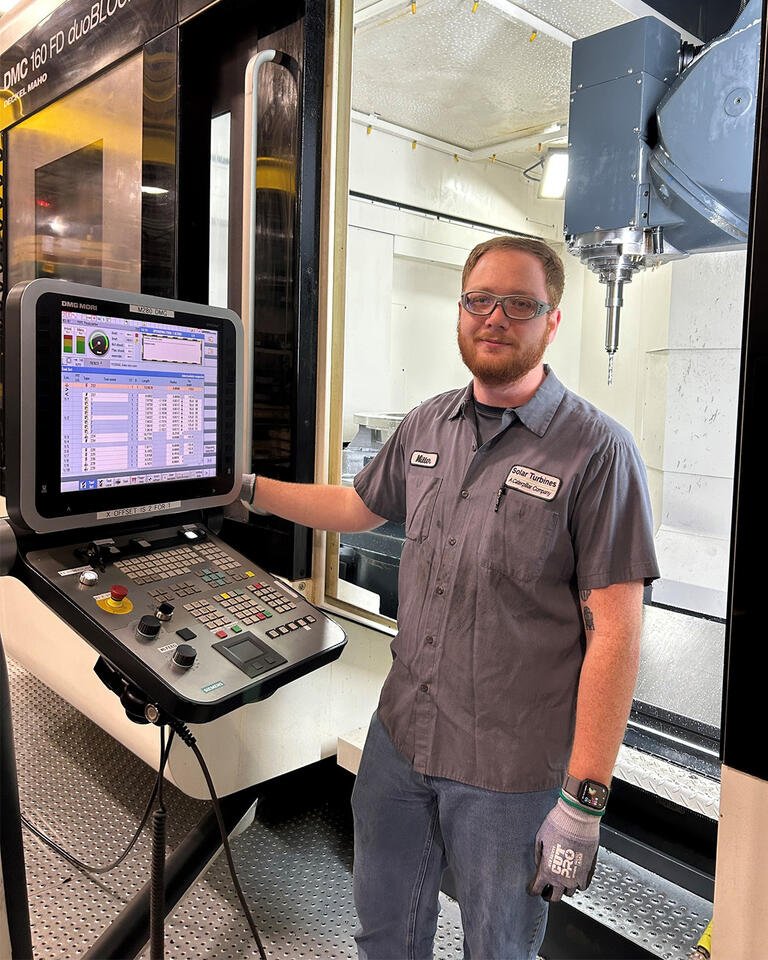TCC Micro-credentials Give Students Career Edge

Published
Tulsa Community College offers free and low-cost micro-credentials that build career-ready skills, verified with a digital badge. Flexible and fast to complete, they benefit both students and employers seeking targeted workforce training.
When Tulsa Community College student Miller Armstrong heard about TCC’s micro-credentials from an instructor, he decided to give them a try. Armstrong, a Manufacturing Engineering Technology student working full-time at Solar Turbines in Broken Arrow, was preparing to apply for a promotion and figured he could leverage a micro-credential to bolster his skillset.
“I was getting ready to apply for an internal position, and I thought it might give me a little edge or make my resume look better,” says Armstrong.

Armstrong chose two micro-credentials closely related to his work and completed them on his own time in about 20 to 30 hours over two weeks. The added skills and recognition helped him stand out in the application process and earn the promotion.
TCC offers a variety of micro-credentials designed to give students short, focused training in career-critical skills, without the time and cost of a traditional degree or certificate.
What is a Micro-credential?
A micro-credential is a short-term postsecondary credential made up of either noncredit learning or up to nine hours of credit coursework. It focuses on specific skills, competencies, and knowledge that can be readily applied in the workplace.
Shannon Schwaebler, TCC Director of Workforce Innovation, says the key components of a micro-credential is that it is short and succinct and it connects to a workplace skill.
“A recognized micro-credential has gone through processes to prove its relevance and importance to Tulsa and Oklahoma’s workforce needs,” says Schwaebler. “Our micro-credentials are approved by the Oklahoma State Regents of Higher Education, and they have to meet certain qualifications. We need to be able to confirm that anyone earning a micro-credential or digital badge has been assessed by TCC and has developed the skill.”
A micro-credential culminates in a digital badge that verifies a person has learned a specific skill and how it was achieved.
Flexible and Cost Effective
TCC micro-credentials are available in-person, online, or a combination of both. Some are self-paced and can be completed entirely online, such as the popular Google Project Management and Google Cybersecurity certificates offered through Coursera. Others blend classroom instruction with practical experience.
For example, the Leadership in Nursing micro-credential combines academic coursework with leadership experience in a student organization. Communication skill badges, another TCC offering, build on general education courses like Public Speaking and Business Communication to help students articulate their skills to future employers.
Most TCC micro-credentials are free or offered at a very low cost. Credit-based micro-credentials often come at no additional charge because they align with courses students are already taking.
“We try to make them as low-cost as possible. When integrated into a credit class, it’s a call-out to a skill set they’ve obtained—they’re already paying tuition and fees,” says Schwaebler. “For noncredit micro-credentials, there are scholarships for Oklahoma residents, often making them free at registration.”
Employer Value
Employers increasingly value short, targeted training that addresses specific skill gaps. TCC partners with local and national organizations to deliver micro-credentials that meet those needs and strengthen the workforce.
“TCC’s micro-credentials give employers a cost-effective way to upskill their workforce,” says Schwaebler. “There is financial incentive to do this through the State Regents, so employers and industry partners really don’t have to provide a big investment up front.”
She adds that companies who have used the program report positive results, with employees gaining skills that translate to better workplace performance. Micro-credentials also give students resume-ready skills they can put to work immediately, even while they continue their degree program. For many, micro-credentials provide a competitive edge for promotions, new positions, or career changes.
Armstrong encourages other students to take advantage of the offerings, noting their affordability and the flexibility to complete them on their own schedule.
“If a micro-credential pertains to your career goals, there’s really no reason to not pursue it because you can do it on your own time, and a lot of times they’re free,” Armstrong adds.
To explore TCC’s micro-credentials, visit www.tulsacc.edu/micro-credentials.
